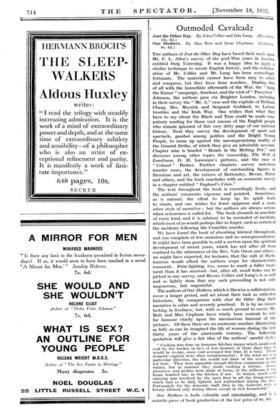Outmoded Cavalcade
Our Mothers. By Alan Bett and Irene Clephane. (Gollanez. Tim authors of Just the Other Day have based their work upon Mr. F. L. Allen's survey of the post-War years in America entitled Only Yesterday. It was a happy idea to apply a similar technique to recent English history, and the collabor- ation of Mr. Collier and Mr. Lang has been exceedingly fortunate. The material cannot have been easy to select and compress, but they have done wonders. Dealing first of all with the immediate aftermath of the War, the hang the Kaiser" campaign, Amritsar, and the visit of" Pussyfoot Johnson, the authors pass via Brighter London, including in their survey the "Mr. A." case and the exploits of Brilliant Chang, Mrs. Meyrick and Sergeant Goddard, to Labour troubles and the Irish War. One wishes that what they have to say about the Black and Tans could be made corn -
• pulsory reading for those vast masses of the English people who remain ignorant of this very dirty page of our national history. Next they survey the development of sport and spectacle, gambol among politics and the Bright Young People, to come up against the uncompromising reality of
the General Strike, of which they give an admirable account. Chapter nine is headed "Morals in the Melting Pot," and discusses among other topics the censorship, The Well of Loneliness, D. H. Lawrence's- pictures, and the case of " Colonel " Barker. Further chapters survey notorious murder cases, the development of outstanding figures in literature and art, the careers of Bottomley, Bevan, Hatry and others, and the book concludes with an economic survey in a chapter entitled "England's Crisis."
The text throughout the book is exceedingly lively, and the authors' comments vigorous and pointed. Sometimes, as is natural, the effort to keep up its spirit leads to strain, and one wishes for fewer epigrams and a more sober style of narrative : but the authors are always serious when seriousness is called for. The book abounds in anecdote of every kind, and it is salutary to be reminded of incidents which most of us would perhaps like to forget, such as certain of the incidents following the Crumbles murder.
We have found the book of absorbing interest throughout, and can complain of few omissions and no misrepresentation. It might have been possible to add a section upon the spiritual development of recent years, which has not after all been confined to the utterances of the Rev. Vale Owen and others : we might have expected, for instance, that the cult of Hoch- manism would afford the authors scope for characteristic comment. Prize-fighting, too, seems to merit a fuller treat- ment than it has received—but, after all, small holes can be picked in any survey, and Messrs. Collier and Lang's is so well and so lightly done that any such proceeding is not only ungenerous, but ungrateful.
The authors of Our Mothers, which is likewise a collaboration, cover a longer period, and set about their task as orthodox historians. By comparison with Just the Other Day their narrative is sober and severely practical. It is by no means lacking in liveliness, but, with so much ground to cover, Mr. Bott and Miss Clephane have wisely been content to rely for humour chiefly upon the unconscious htunour of the pictures. Of these there are an enormous number, illustrating as fully as can be imagined the life of woman during the last thirty years of the nineteenth century. The following quotation will give a fair idea of the authors' careful style : "Cooking was done on immense kitchen ranges which swallowed
coal by the bucket (a fact of leas moment in those days than it would be to-day, since coal averaged less than LI a ton). These domestic engines were often temperamental ; if the wind set in a particular direction, the fire would not draw or the oven would not heat. They were agreeable enough kitchen companions in the winter, but in summer they made cooking a torture. Janis, preserves, and pickles were made at home, in the stillroom if the house boasted one, in the kitchen if not. In winter, much coal carrying was involved by the open fires in all the living-roorns, which had to be laid, lighted, and replenished during the day. Fortunately for the domestic staff, fires in the bedroom were a luxury allowed only during illness except in rich households."
Our Mothers is both valuable and entertaining, and is 3 notable piece of book production at the low price of 8s. Cul.
































































 Previous page
Previous page